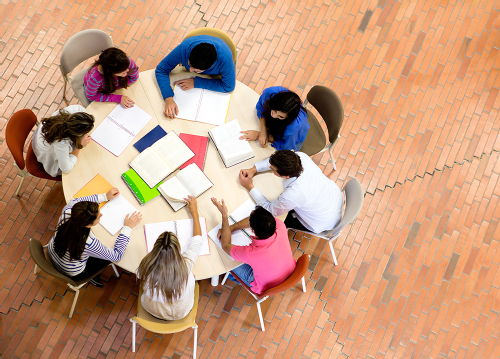Peer Support

One of the most beneficial and enjoyable aspects of being a student at Warwick Medical School is the way in which members of the second-year cohort work together to help newer students. There are several ways in which this happens and the benefits are widespread and tremendous.
Usually on one evening every week during term time, a group of second-year students will present summaries of particularly difficult topics that the first-years have covered in lecture or group work in the previous week. This is known as "peer support", and is very famous in the MB ChB programme. Six pairs of second-years will each set up in a different classroom and will each cover a different topic, and then the first-years will divide themselves into six groups and split themselves across the stations. Every twenty minutes the groups rotate to another station, and within two hours the evening is completed. Stations can cover all sorts of topics and are usually quite diverse by design.
A handful of times in the year, the second-year students will also organise OSCE (Observed Structural Clinical Examination) peer-support sessions. The premise is the same: first-years will rotate between sessions which cover potential OSCE topics: history-taking, clinical examinations, other important hospital skills such as in-hospital resuscitation and hand washing.
This year also sees something new; in order to keep the continuity between first-year groups and their second-year instructors, the medical society has launched the “student-seminars” initiative, which matches a group of up to twelve first-years with two second-year instructors for an evening per week over the entire course of a five-week block. There are several of these groups running concurrently on various weekday evenings. Topics can be varied and diverse, but the setting is meant to focus less on rotation and covering many topics (as opposed to peer support) and more on covering a handful of difficult topics in depth.
The benefits of each of these initiatives are numerous. These student-led revision sessions allow students across cohorts to bond – I have got to know dozens of people in cohorts on either side of me just through attending peer-support sessions whom I never would have met otherwise. It also allows students to hear real-life accounts and experiences from those who’ve already lived through what they’re going through now. Each session helps students approach topics from different angles – not just the ones that are presented in lecture theatres or on Power Point slides. Not everyone learns in the same way, and hearing another person’s approach on a complicated topic can be extremely helpful for anyone who’s confused. And finally, all of the slides from the sessions are available online, allowing students to access them at any time – providing extremely valuable resources at revision time.
John
 Megan Earle
Megan Earle

 Loading…
Loading…
Add a comment
You are not allowed to comment on this entry as it has restricted commenting permissions.